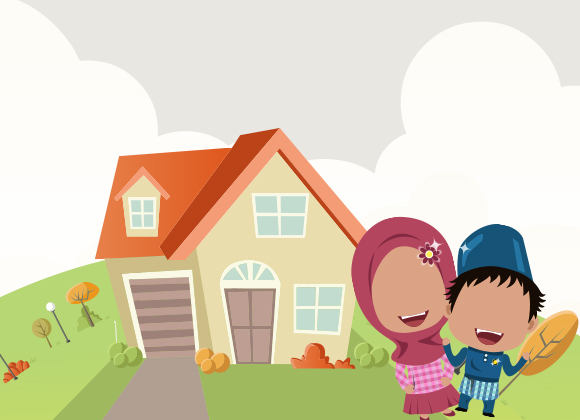
We live in a world where our sphere of concern is greater than it has ever been, encompassing the entire globe fueled due to the advent of international news and the Internet. Meanwhile our sphere of influence has been ever shrinking due to the larger number of people cohabiting the world simultaneously and a loss of sense of community in many parts of the world with even the family unit breaking under a variety of stresses and pressures. Yet, despite our inability to influence the world, the state, the community or even our families, we generally still have a living environment which we have complete control over.
The environment we live in might be extremely polluted with un-Islamic people, culture, norms, forbidden activities and indulgences widespread. But the environment we spend those hours eating, sleeping and spending our idle time is of utmost importance simply because we do have the ability to control it. Our homes are a critical part of our life and the idiom “home is where the heart is” shows the great role it plays in our life, yet, more importantly, we should be aiming to draw near Allah ![]() . We should transform our homes so that remembering Allah
. We should transform our homes so that remembering Allah ![]() is where our heart is, ultimately experiencing true peace and contentment.
is where our heart is, ultimately experiencing true peace and contentment.
What is an Islamic home? Can the modern home be Islamic? The answers to these questions must be derived from pearls of wisdom of the Sunnah of our beloved Prophet Muhammad ![]() . Nearly all Islamic principles apply to the home given it is a place we spend so much of our time in; and should be our place of safety, security, grounding, peace of mind and recovery.
. Nearly all Islamic principles apply to the home given it is a place we spend so much of our time in; and should be our place of safety, security, grounding, peace of mind and recovery.
Attending to Neighborly Needs
Neighbors not only deserve kindness but they have many rights to it. One should bear in mind remembering their neighbors when considering their home. A successful and positive community comes about when neighbors attend to each others rights which could ultimately change the environment of the whole area. There are many rights afforded to neighbors which make Islamic building codes, and etiquette to neighbors when cooking or after having purchased fruit.
Narrated Samurah ![]() : The Messenger of Allah
: The Messenger of Allah ![]() said: “The neighbor of a home has more right to the home.” – Tirmidhi.
said: “The neighbor of a home has more right to the home.” – Tirmidhi.
The rights are actually so great that they are stressed in the Sunnah.
Mujahid ![]() narrated: “Abdullah bin Amr had a sheep slaughtered for his family, so when he came he said: ‘Have you given some to our neighbor, the Jew? Have you given some to our neighbor, the Jew? I heard the Messenger of Allah
narrated: “Abdullah bin Amr had a sheep slaughtered for his family, so when he came he said: ‘Have you given some to our neighbor, the Jew? Have you given some to our neighbor, the Jew? I heard the Messenger of Allah ![]() saying: ‘Jibril continued to advise me about (treating) the neighbors so (kindly and politely), that I thought he would order me (from Allah) to make them heirs.” -Tirmidhi.
saying: ‘Jibril continued to advise me about (treating) the neighbors so (kindly and politely), that I thought he would order me (from Allah) to make them heirs.” -Tirmidhi.
The book Leadership Lessons from the Life of Rasoolullah: Proven Techniques of How to Succeed in Today’s World by Shaykh Mirza Yawar Baig goes on to list these rights in detail which the Messenger of Allah ![]() narrated to the Sahaba, which we should bear in mind to maintain such honorable and noble tradition even as hard as it can be, in our modern style communities:
narrated to the Sahaba, which we should bear in mind to maintain such honorable and noble tradition even as hard as it can be, in our modern style communities:
1. Assist him when he asks for assistance.
2. Give him a loan if he needs it.
3. Help him if he is needy.
4. Visit him when he is ill.
5. Accompany his funeral when he dies.
6. Congratulate him on happy occasions.
7. Console him in adversity.
8. Do not build your house higher than his without his permission lest his ventilation is obstructed.
9. If you buy fruits, send some for him as a present. If you cannot do so, take the fruit into your house concealed so that he cannot see it. Don’t allow your children to take it out and eat openly in case his children see it and become grieved.
10. Don’t let the smoke from your house get into his house causing him annoyance.
Acts of Worship
The home should be a spiritual abode. Prayers, supplications, ghusl and wudu, acquiring Islamic knowledge, reciting the Quran are just some of the spiritual activities that should be undertaken on a routine basis. Not doing so will turn the home into a negative atmosphere. If you are returning home after praying in the mosque, then it is recommended to save the optional prayers for the home to bring light, blessings and angels into it.
Zaid bin Thabit ![]() narrated that: The Prophet
narrated that: The Prophet ![]() said: “The most virtuous prayer of yours is in your homes, except for the obligatory.” – Tirmidhi.
said: “The most virtuous prayer of yours is in your homes, except for the obligatory.” – Tirmidhi.
Avoiding Idolatry, Dogs, Etc.
Portraits, statues and the like should not be displayed whether it be paintings, sculptures, photographs or whatever the material form. Dogs are also not allowed in an Islamic home with the exception of a guard dog when security is an issue. Some people can make these types of mistakes unknowingly out of ignorance, especially in cultures where it is common place. Cleaning the home from these types of things will bring immediate spiritual benefit.
Narrated Abu Talha ![]() : The Prophet
: The Prophet ![]() said, “Angels do not enter a house that has either a dog or a picture in it.” – Al-Bukhari.
said, “Angels do not enter a house that has either a dog or a picture in it.” – Al-Bukhari.
Simplicity
A very important aspect of the home is to practice simplicity. The Prophet ![]() would not enter a home which was excessive in the adornments and embellishments of this world. Wealth should be spent where it’s needed; not in a manner where you want a beautiful home that is spiritually empty and shallow in all other ways.
would not enter a home which was excessive in the adornments and embellishments of this world. Wealth should be spent where it’s needed; not in a manner where you want a beautiful home that is spiritually empty and shallow in all other ways.
Abu Umamah bin Tha’labah ![]() reported: The Companions of Messenger of Allah
reported: The Companions of Messenger of Allah ![]() mentioned the life of the world before him. He
mentioned the life of the world before him. He ![]() said, “Do you not hear? Do you not hear? Simplicity (in life) is part of Faith, simplicity is part of Faith.” – Abu Dawud.
said, “Do you not hear? Do you not hear? Simplicity (in life) is part of Faith, simplicity is part of Faith.” – Abu Dawud.
The furniture and food also need not be extravagantly elegant or excessive. The principle applies to the home and all that is inside the home.
Remembering Allah and the Hereafter
The ultimate aim of this life is to worship and please Allah ![]() maintaining the hereafter as the goal and not any small benefits of the worldly life. The Quran is very firm on this and thus our home should reflect it given the amount of time spent in it. We need reminders so that we do not forget Allah
maintaining the hereafter as the goal and not any small benefits of the worldly life. The Quran is very firm on this and thus our home should reflect it given the amount of time spent in it. We need reminders so that we do not forget Allah ![]() and what He
and what He ![]() has blessed us with and the home is an essential place for them. Specific strategies from keeping the Quran near at hand or prayer clothing nearby or a siwak (tooth stick) next to the place one does wudu, are of the many examples that will be looked at in detail later in this series.
has blessed us with and the home is an essential place for them. Specific strategies from keeping the Quran near at hand or prayer clothing nearby or a siwak (tooth stick) next to the place one does wudu, are of the many examples that will be looked at in detail later in this series.
“…the men who remember Allah often and the women who do so – for them Allah has prepared forgiveness and a great reward.” – (Al- ‘Ahzab 33:41)
To be continued…








2 replies on “The Modern Islamic Home: Aspects and Principles (Part I)”
[…] For Part I, click HERE […]
This is my first time go to see at here and i am actually pleassant to read everthing at alone place.